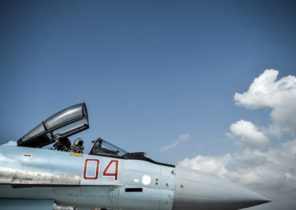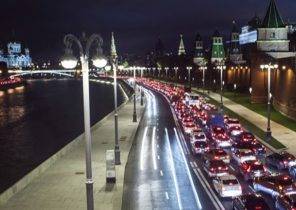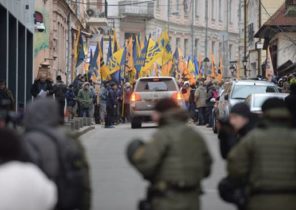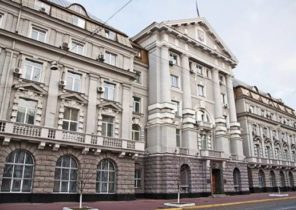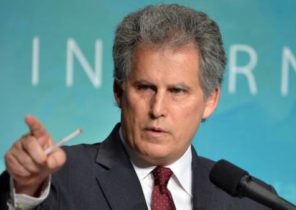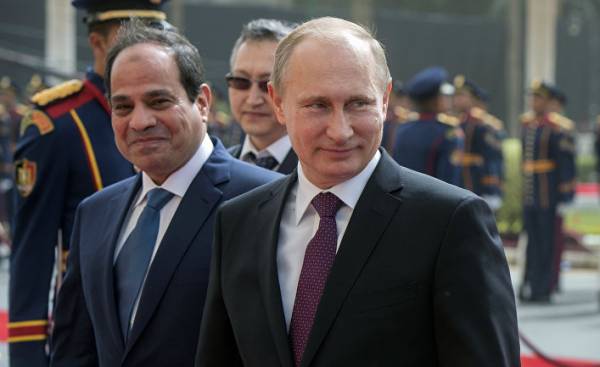
According to recent polls, most young Arabs is considering Russia as its ally. In many respects it became possible thanks to active position of the Russian diplomacy, which is trying to regain its former presence in North Africa and the Middle East. This development is worrisome to the West because of fears the growing influence of Moscow in the region.
Company ASDA’a Burson-Marsteller, specializing in the polls in the Middle East and North Africa, published the results of its annual study of attitudes of Arab youth Arab Youth Survey. The survey involved 3.5 thousand people aged 18 to 24 years from 16 countries of the region. All the differences of points of view on various political and social developments in different Arab countries, the researchers note two obvious trends. The growth of confidence in Russia and a simultaneous decrease in trust to the United States. Moreover, Russia surpassed the US in terms of confidence on the part of Arab youth.
According to the report, last year 9% of young Arabs said that treat Russia as the most loyal ally in the world, this year the figure was already 21%. The increase thus amounted to 12%. In turn, the credibility of the United States fell even more sharply. If in the past year, the United States as the main foreign ally seen in 25% of the respondents in the current — only 17%.
One of the reasons for these changes is the shape of the new US President Donald trump, to whom with concern, anger, or fear are more than two-thirds of respondents — 64%.
America’s reputation has been tarnished by the recent military operations in the region, uniting the countries of the Maghreb and the Middle East in the first place, the occupation of Iraq (2003-2011). Moscow managed to take advantage of the situation. Russia, where according to the Russian non-profit research organization Sreda 6% of the population practice Islam, has good relations with all countries of the region and looks into the eyes of the Arabs a potential candidate mediators in solving regional disputes. The extension of Russian influence in the region, construction of new Russian military bases abroad is not a cause of fear in the West.
Syria
Without a doubt, the biggest Russian presence is celebrated in Syria, especially since the beginning of the conflict in 2011. Of all the Arab States, Syria was a major ally of the Soviet Union and later Russia in the middle East. USSR 1971году in accordance with the bilateral agreement with Damascus got the point of logistics of the Navy in Tartus. The base in Tartus allows the Russian fleet to carry out repairs, supply of fuel and water to vessels based in the Mediterranean. In the future Russia and Syria signed an agreement to expand the territory of point of logistics Russian Navy in Syria’s Tartus with a validity of 49 years.
Simultaneously with the agreement, Moscow and Damascus signed a Protocol defining the conditions of accommodation of planes of the Russian HQs in Syria. From this it follows that Russia is carrying out air defence sites and places of deployment of Russian aviation groups in Syria and the point of logistics of the Navy from the air and sea. The participation of the Russian military in the Syrian conflict has allowed the Syrian armed forces in March 2016 to regain control of the city of Palmyra, and in December 2017 release from terrorists Aleppo.
Russian aircraft involved in military operations in Syria and support government troops in the war with the Islamic state, placed in the region of Latakia on the Syrian air base Hamim. In January 2016, Russia and Syria signed an agreement with aviation group of the Russian bases Hamim indefinitely and free of charge. Under the agreement, the Russian side can import and export into Syria any weapons, equipment, and materials, and also enjoy diplomatic immunity, and be responsible for all will be the Syrian government.
At the airbase Jmaimon from February 2016 is also based Centre for reconciliation the warring parties in Syria. It was opened in accordance with the Russian-American agreements on the establishment of ceasefire in the Syrian conflict.
American and Russian troops work together to determine areas on maps, where the fire will not be maintained, and coordinated strikes against ISIL and “Dzhebhat EN-Nusra” (a terrorist organization banned in Russia — approx.ed). The center coordinates the delivery of weapons to opposition groups that agreed to accept the Amnesty President al-Assad, and also delivers humanitarian aid to the civilian population.
In addition, Russia together with Turkey and Iran is one of the three guarantors of the negotiation process in Astana with participation of the representatives of the Syrian government and the armed opposition. United States participate as observers.
Despite close relations with the government of Bashar al-Assad, Moscow maintained relations with the Syrian Kurds. In February 2016, the party “Democratic Union” (PYD), whose armed forces take an active part in the fight against the Islamic State, has opened an office in Moscow in Syrian Kurdistan. In the Russian draft of a new Constitution for Syria from the name of the country — Syrian Arab Republic — should disappear, the word “Arab”. This gives the Kurds hope to federalization.
Co-chair of the democratic Party Salih Muslim (Salih Muslim) does not preclude the holding of a referendum on independence. However, he advocates the establishment of a democratic Syrian state based on federalism taking into account the interests of all ethnic-groups living in the country.
20 March 2016, the official representative of the militia of the Syrian Kurds in interview to Agency Reuters said that Russia and the Kurdish people’s defense (YPG) have reached an agreement on the establishment of a military base near the Kurdish enclave of Afrin to combat terrorism. The defense Ministry immediately denied the information about creation of a new base in Syria.
Contacts with the Syrian Kurds Moscow does not advertise, fearing a negative reaction from Turkey, which has repeatedly expressed its displeasure with the Kremlin’s actions in support of the Kurds.
Libya
After the attack on Aleppo, the aircraft carrier “Admiral Kuznetsov” left the port of registry — port of Severomorsk. On the way back home, January 11, the ship stopped in international waters near the coast of Libya. Libyan General Haftar (Haftar), which is at the head of the Libyan national army controls the Eastern part of the country, visited avianese the cruiser “Admiral Kuznetsov” and spoke via video linkup with Russian defense Minister Sergei Shoigu. They discussed the fight against international terrorist groups. In a press there were comments that the Haftarot and Shoigu discussed the possibility of opening new military base in the Mediterranean, as well as providing aviation support to units of the Libyan General, on Syria.
After the death of Muammar Gaddafi in 2011, Libya began the political struggle for power. Currently, the Government of national consent headed by the Libyan Prime Minister Fayez al-Barragem (Fayez al-Sarraj) controls the Western part of the country, while General Haftarot-controlled Eastern part of Libya, where most oil fields and pipelines.
The situation in Libya is of great concern in the European Union. The chaos in the country allowed the smugglers to establish the illegal migration from Libya to Europe. The distance between the Libyan coast and the Sicilian island of Lampedusa is only 460 miles. The unstable situation in Libya threatens the supply of Libyan gas through the GreenStream pipeline to Italy. The pipeline is pumped 11 million cubic meters of gas per year. In November 2013 and 2017 because of the unrest of the Berbers interrupted the supply of Libyan gas to Italy.
The national consensus government enjoys the support of Germany and Italy. General Haftar in 2016, has twice visited Moscow and held talks with Russian defense Minister Shoigu and Russian foreign Minister Sergei Lavrov. 26 December 2016 Deputy Minister of foreign Affairs of the Russian Federation Gennady Gatilov has said publicly that General Haftar needs to be part of the new Libyan government.
Recently there were rumors that Moscow has sent trainers and military advisers to Eastern Libya. In view of the changed situation in Italy in January 2017 for the first time has sent humanitarian aid in areas of Libya controlled by the General Haftarot. The proximity of the Libyan General with Russia and its desire to expand political and military Alliance with Moscow, the Haftarot in the Arab world called “sly Fox Putin.”
Russia is boosting its economic influence in Libya. The state oil company “Rosneft” signed an agreement to develop oil fields with Libya’s national energy company Noc. “We need aid and investment in major international oil companies to achieve our goals for the production and stabilization of our economy”,- said after signing the agreement with Russia, the head of the Noc, Mustafa Sanalla.
Egypt
In 2013, in Egypt there was a military coup that toppled elected in 2012, President Mohamed Morsi. Foreign Minister of Egypt Nabil Fahmy (Nabil Fahmy) at a meeting in Cairo with Minister of defense and head of the foreign Ministry of Russia expressed interest in multilateral cooperation, including the military, as it was in Soviet times. This was largely due to the fact that after the coup the White house vetoed the sale of arms to Egypt.
In February 2014, Egyptian President Abdel Fattah al-Sisi went to Moscow to establish relations with Vladimir Putin. The Kremlin has warmly welcomed the Egyptian leader and expressed interest in expanding cooperation both in economic and military sphere.
In October 2016, Russia and Egypt for the first time held joint exercises airborne units. At the same time Gazeta Russian “Izvestia” reported that Russia is negotiating with Egypt for the rental of Egyptian military installations, including the Soviet military air base in the Egyptian city of Sidi Barrani, which was used by the Soviet Union until 1972. The base is located 95 kilometers from the Libyan border. In March 2017 in a press there was an information that Russia has deployed military personnel and drones at the air base in Egypt near the Libyan border.
According to American and British diplomatic sources, in early February, Russia used and other Egyptian base located to the East, to Marsa Matruh (Marsa Matrouh). Unit of several dozen armed contractors from Russia were in that part of Libya which is under the control of the Haftarot.
Thus, Russia is trying to increase its influence in Libya to strengthen the leverage of the future leader of the country.
Israel
Although Israel is not an Arab country, it is obvious that he plays closewool in the balance of forces in the region. Diplomatic relations between Israel and the Soviet Union were tense due to the fact that the Soviet Union provided support to the Arab countries that embarked on the socialist path of development. Israel’s relations with the Soviet Union were also overshadowed by bureaucratic obstacles that repaired the Kremlin concerning Soviet Jews who wanted to leave the Soviet Union. Subsequently, these Jews largely contributed to the establishment of Israel’s relations with Moscow.
“Currently, Israel is home to more than 1.3 million Jews immigrated from the former Soviet republics”, — writes the newspaper The Times of Israel. Russian language is the third most common in Israel. Russian media presented the Israeli newspaper “Vesti”, TV channel Israel Plus. The number of people speaking Russian in Israel up to eight million people, and the Russian-speaking community is well represented in the power structures of Israel.
The Minister of defence and leader of the conservative party “Our home — Israel” Avigdor Lieberman (Avigdor Lieberman) was born in Chisinau, the head of the Ministry of immigrant absorption Sofa Landwehr was born in Leningrad, and the Minister of environmental protection of Israel, Zeev Elkin (Ze’ev Elkin) a native of Kharkov.
Russian-speaking community in Israel has become a political factor within the Jewish state. Positioning her to win the sympathy of the natives of the former USSR trying many leading Israeli politicians behind them and the party. According to a survey conducted by the Institute of statistics of Israel 67% of Jews who came from the former Soviet republics, first and foremost, feel the “Russian Jew” and prefer to communicate with Russian-speaking population of Israel.
“Despite recent events in Syria, relations between Russia and Israel remain the warmest in the entire history of bilateral relations”, — notes the newspaper The Jerusalem Post. As in the case of Egypt, Moscow has managed to benefit due to the cooling of relations between Israel and the United States during the reign of Barack Obama.
Despite the fact that Russia maintains close relations with the traditional enemies of the Jewish state ─ Syria, Iran, Palestinian national authority (PNA) ─ Israelis appreciate the pragmatism of Russian diplomacy, and relations with Moscow have found a counterbalance to its relations with Washington and Brussels. Russia, in turn, can rely on tel Aviv in its relations with the West.
Many analysts believe that the Kremlin did not respond harshly to Israeli bombing in Syria in order not to disturb the balance. Others note that good Moscow’s relations with Syria and Iran could help resolve the Israeli-Palestinian conflict, where Russia could become a mediator. We should not forget that the “Quartet” of international mediators on the Middle East includes Russia, the US, the EU and the UN.
Israel is cooperating with Russia in such a sensitive area as military. Since 2009, the Russian army buys Israeli drones in development. In September 2015 the contract for the supply of drones in the amount of approximately $ 300 million.
There is also a direct encrypted communication line between Russian President Vladimir Putin and Prime Minister of Israel Benjamin Netanyahu.
